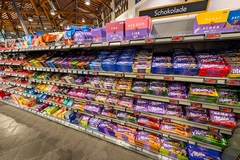
- Industry news
Industry news
- Category news
Category news
- Reports
- Key trends
- Multimedia
- Journal
- Events
- Suppliers
- Home
- Industry news
Industry news
- Category news
Category news
- Reports
- Key trends
- Multimedia
- Events
- Suppliers
England to enforce national ban on energy drinks for under-16s

The UK government is planning to ban the sale of high-caffeine energy drinks to children in England under the age of 16 in an effort to tackle mental and physical health concerns.
The measure would prohibit all retailers from selling products containing more than 150 mg of caffeine per liter to under-16s. A consultation will run for 12 weeks to gather input from health experts, educators, manufacturers, and the public.
According to government figures, around 100,000 children consume at least one energy drink daily. Studies link regular consumption to sleep disruption, anxiety, poor concentration, and lower academic performance. Ministers say the ban could also help prevent obesity in up to 40,000 children and save tens of millions of pounds on annual healthcare costs in the country.

Health and social care secretary Wes Streeting highlights the scale of the issue: “How can we expect children to do well at school if they have the equivalent of four cans of cola in their system on a daily basis? Energy drinks might seem harmless, but the sleep, concentration, and well-being of today’s kids are all being impacted, while high-sugar versions damage their teeth and contribute to obesity.”
Research shows that one-third of children aged 13 to 16 and nearly a quarter of those aged 11 to 12 consume at least one energy drink a week. Children in more deprived communities are more likely to consume these products, which the government says contributes to widening health inequalities.
Education secretary Bridget Phillipson ties the proposals to broader reforms. “This government inherited a scourge of poor classroom behaviour that undermines the learning of too many children — partly driven by the harmful effects of caffeine-loaded drinks — and today’s announcement is another step forward in addressing that legacy,” she states.
Although many major retailers already restrict sales voluntarily, officials argue that smaller stores often continue to sell to children, underscoring the need for consistent national rules. The ban would not affect lower-caffeine soft drinks, tea, and coffee.
The announcement forms part of the government’s “Plan for Change” initiative, which emphasizes prevention measures. Alongside the consultation, ministers are rolling out supervised toothbrushing for three- to five-year-olds, supporting free breakfast clubs and expanding childcare provision.
Scotland, Wales, and Northern Ireland are also reportedly considering similar bans.









